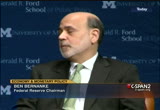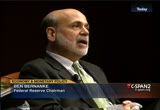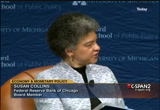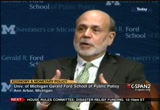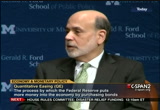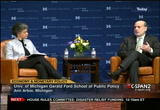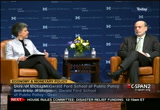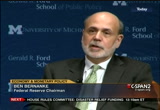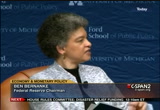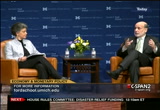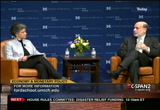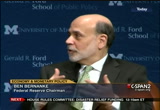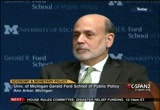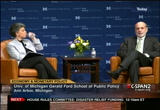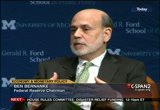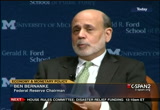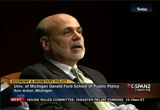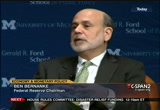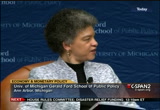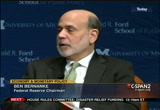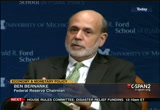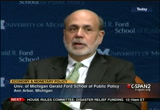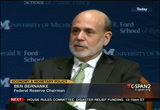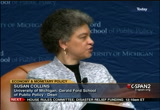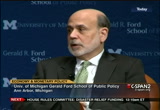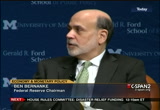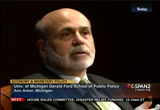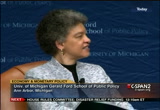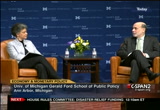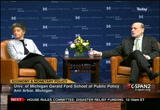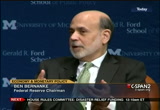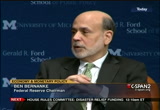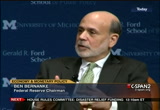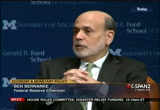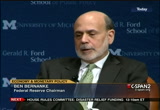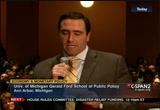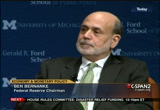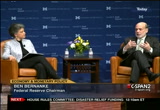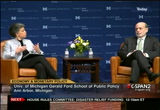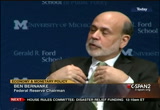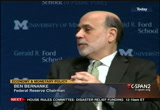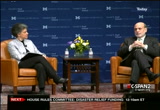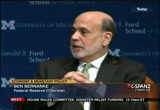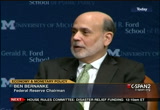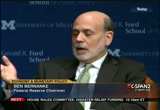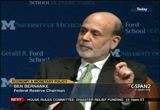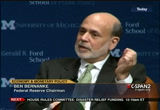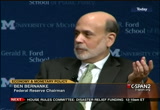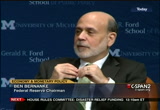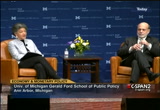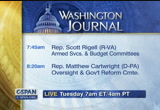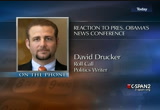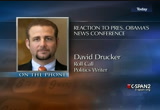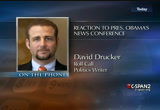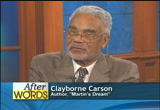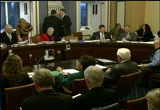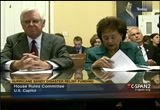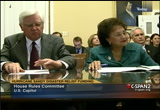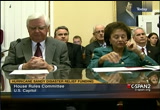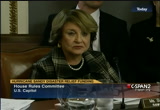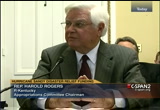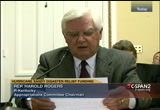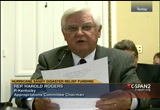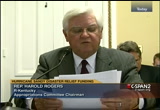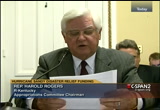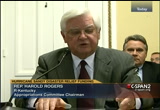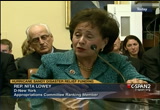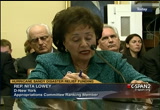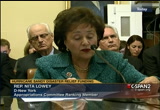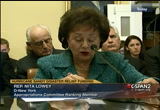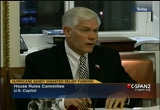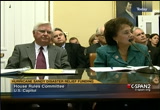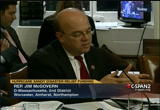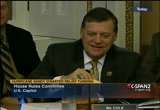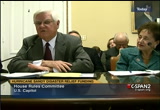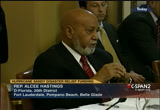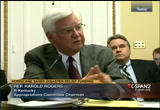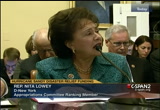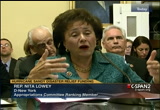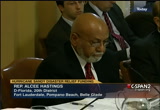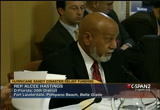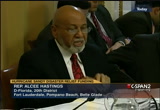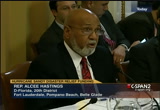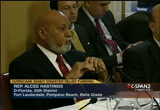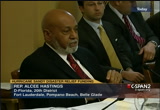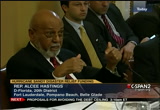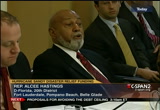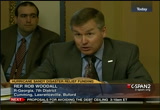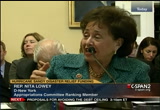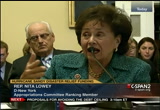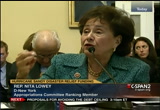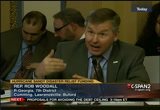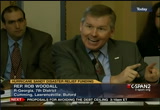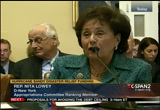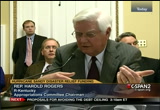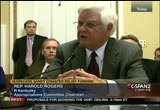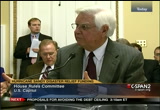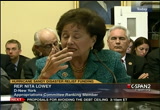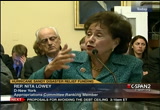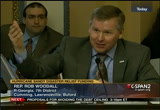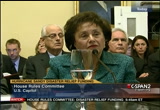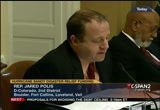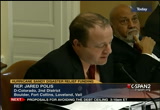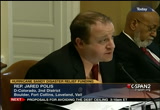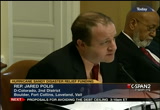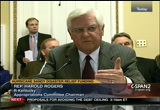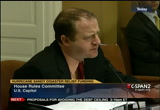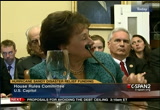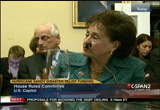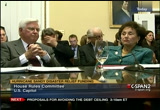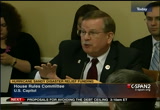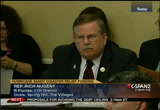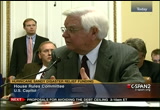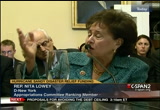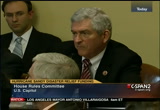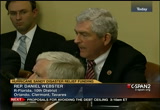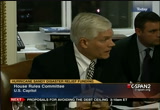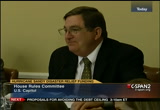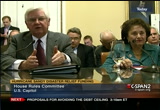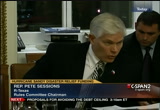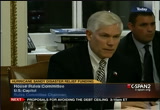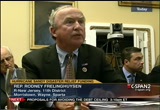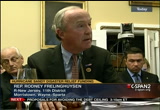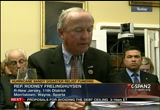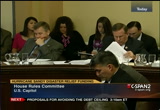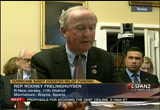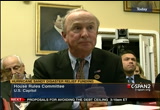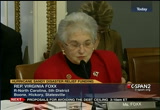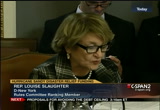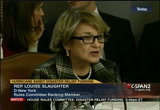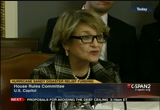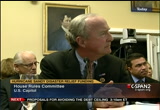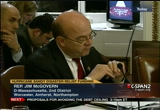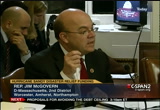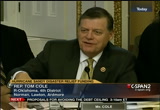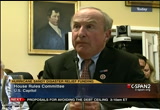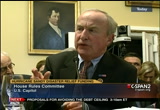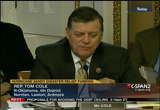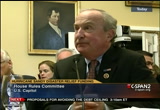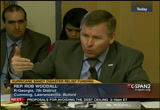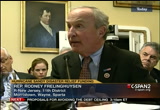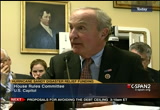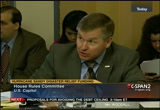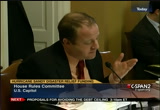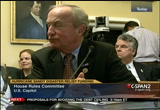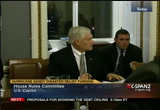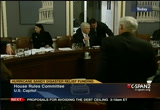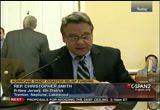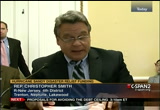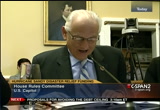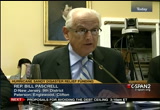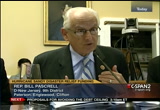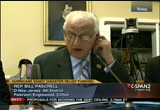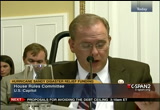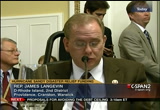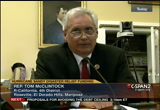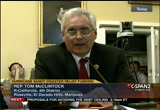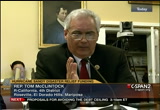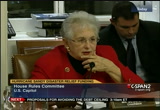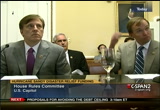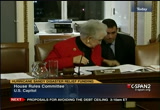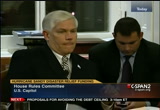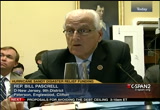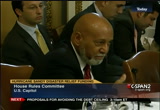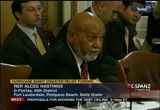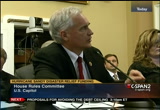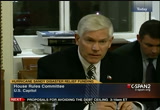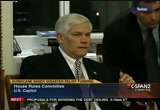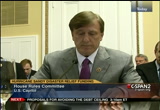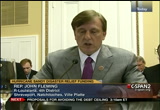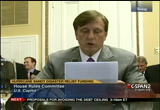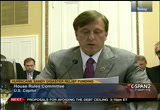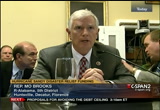tv Capital News Today CSPAN January 14, 2013 11:00pm-2:00am EST
11:00 pm
raising the debt ceiling gives the government the ability to pay its existing bills. it doesn't create new deficit spending. so not raising the debt ceiling is sort of like a family that's trying to improve its credit rating. families that say, i know how we can save money, we won't pay her credit card bills. it was the sole solution to the debt ceiling in august of 2011 in the u.s. downgraded last time. so all these issues are important and it's very important that congress take necessary action to raise the debt ceiling to avoid a situation where government doesn't pay its bills. >> a number of people have expressed concern about how much of the challenges actually were
11:01 pm
addressed in a deal, it certainly went part way, but leaves a number of issues still on the table. would you care to raise that as an additional fiscal cliff that is facing us? would you think that it's not as concerning as it was when you raise that term initially? >> as i said the fiscal cliff, if it is allowed to take place, it probably would have traded a recession this year. a good bit of that has been addressed. nevertheless, we still have fairly restrictive fiscal policies now. it is estimated that federal fiscal policy will we have quite a bit to do to address the their long-term sustainability issues. there's a lot more work to do. let me be very clear about that.
11:02 pm
it's going to be a long haul and it's not going to happen overnigh3 it's going to be a long haul and it's not going to happen overnight. we because the government budget represents the values and priorities of the public and the decisions being made about what to spend and tax and someone, they are very difficult and contentious decisions that take time to address. >> , those issues, of course, are not the specific purview and why don't we shift gears and talk more explicitly about some of the things that the fed is doing and things that the fed might do. perhaps a way to introduce that is to say that that is in keeping interest rates close to zero, since it has dug pretty deep into an unconventional policy.
11:03 pm
asset purchases are meant to help in the short term. can you explain that? >> well, monetary policy involved the overnight interest rate up and down and hoping that the rest of the interest rates would move in sympathy. then we get a situation in 2008 where we had dropped the short-term rate down about as far as it could go come almost entirely to zero. so the question is what work did the fed do. there are many people a decade ago event a lot of articles about how the fed would be out of ammunition if they got down to zero. a lot of work by academics and others, researchers of the central bank suggested that there was more that could be done once the short-term rate back down to zero.
11:04 pm
and what you can try to do is bring the longer-term rates down. the idea being that you're going to keep rates low in a long-term and that will have the effect of pushing down longer-term interest rates. the idea is that by buying large quantities of treasury securities were mortgage-backed securities that we can effects are kind of early we have
11:05 pm
succeeded in bringing long-term rates down pretty significantly it creates jobs, and real estate activity is affected and so on. broadly speaking, we have found this to be an effective tool. and we will continue to assess how effective because it's possible that as you move through time and the situation changes, the impact of these tools can vary. i think what we have decisively shown is that the short-term interest rate getting down to
11:06 pm
zero, what economists call the zero bound problem, and does not mean there is a set of ammunition. there are things we can do, things that we have done. other central banks have done similar things and have also had some success in creating more monetary policy support for the economy. >> you had mentioned that there has been evidence that the longer-term interest rates have come down to the initial round. concern is that the unemployment rate remains very high and activity would try to bring that down and one would hope to see additional movements from the most recent round. are you suggesting that one would need to be patient? needs a little bit more about how you would assess how this is having the kind of effect that you would anticipate? >> well, we will be doing that on a regular basis.
11:07 pm
we will be looking at the impact on financial markets and we will see some effect there. we will look to see whether or not the labor market situation. we first started talking about a .1% on employment, there has been some movement. there was nearly 40% of the unemployed having been out of work for six months or more. that is a situation where there are too many people i can give
11:08 pm
you specific criteria except to say that we will be assessing the impact of our actions a financial market conditions and looking to see how those link up to developments in labor markets and in the broader economy. you have to think and ask yourself what would've happened if we hadn't taken these actions. but again, the evidence seems to be an outside not only the evidence on the u.s., but on the uk and elsewhere, that these types of policies do have an impact on the economy. >> we hope that there will be more of an impact going forward to bring the breakdown quickly.
11:09 pm
>> the pace of improvement, that's an interesting question. because the pigs of economic growth over the last few years since the beginning of the recovery has not been as strong as you normally would think would be needed to get really big improvements in the labor market. nevertheless, we are seeing declining unemployment which is fairly significant, and we hope to see an ongoing improvement there. so it's a little bit hard to judge exactly how much more improvement we will see. but certainly we want to keep things going in the right direction. in terms of additional tools, once you get the short-term interest rate down to zero, there is basically two principal coaches. either a securities purchase or communication.
11:10 pm
there are a few other things of smaller magnitude, like the interest rate that we pay on the excess reserves, for example. but i think those are the two basic approaches that we have. we can and try to improve our communication and be more effective, but there is no aware tactic that we have not yet attacked the. >> we have just had a meeting at the detroit board of directors which provides some information about the conditions more explicitly in this region. and there are conditions that vary across the country. i wonder if you could share how you factor in across different parts of the economy when making decisions that are more aggregate? >> well, first, thank you for
11:11 pm
11:12 pm
i've heard from another people throughout the auto industry and health care, academics, industry, variety of various things and that is very useful. it's become much more diversified. and they still have a significant reliance on auto production. it has now come back quite a bit as the auto industry has improved. and so we are seeing some strengthening, although conditions here are still not where we would like them to be. the housing market has also come
11:13 pm
back some in michigan. but like many other industrial parts of the country, this includes bringing in high tech services, health care, education and so on. places like the university of michigan in ann arbor are a tremendous resource and people trying to develop high-tech businesses so it is an opportunity to see that america has a powerful industrial base
11:14 pm
there are some positive things to look at. one of the key positives that i already made reference to his housing. as you know, house prices in the u.s. fell about 30% for the first time, since the 2007, 2006, we are starting to see increases in production and rising house prices and how that will affect household wealth. that is one positive factor that is going to help us out and help us to have a better year in 2013 and in 2014. a few other things that are positive is that state and local governments, which have been in contractionary mode because of the loss of everything.
11:15 pm
they wanted to check on the economy that they have been for the last two years. the energy industry is looking much stronger. consumers are more optimistic than the university of michigan publishes the index of consumer sentiment, which is one of the very best guides with how consumers are feeling. as long as the fiscal policy keeps going, there will be some progress. we still have quite a ways to go before we will be dissatisfied.
11:16 pm
it is actually taken some of the pressure off of congress to try to address these fiscal challenges. the critics on both sides -- you should give the other guys a chance. >> i will get there. [laughter] >> okay. well, let me first say that as we think about the costs and risks of any policy, we should also think about what we are trying to accomplish and i have made reference already that the federal reserve has a dual mandate from congress to achieve
11:17 pm
maximum employment. price stability means low inflation we have basically taken that to mean 2% inflation and has been in the very low 2% range and appears to be on track for up to 2%. unemployment, as we have learned discussed, is still quite high. it has been coming down, but very lowly. cost of that is enormous in terms of lost resources and hardship and talents and skills being wasted. so our efforts are very important to try to create this environment is most appropriate.
11:18 pm
that is what we are doing. there are potential risks and inflation was mentioned. we have obviously used an expansionary monetary policy and we have increased the amount of reserves that banks hold with the bad. there are some people that think that that will be inflationary. personally i don't see much evidence of that. inflation, as i mentioned, has been quite low. expectations remain anchored. private sector forecasters do not seek any inflation coming up, and in particular, we have, i believe, with all the tools that we need to undo our monetary policy stimulus and to take that away for inflation becomes a problem. so i do not believe that you can
11:19 pm
inflation is going to be a result of any of us. that being said i stability -- in terms of stability, it is well maintained. the other thing worth mentioning is financial ability. this is a difficult issue. the concern has been raised by keeping interest rates very low that the federal reserve induces people to take greater risks in their financial investments, and that could lead to instability later on in life. again, a difficult question. i could probably take the rest of the hour talking about it. but what i will say is that we are first law very much engaged in monitoring the economy.
11:20 pm
the fed has increased enormously the number of resources into monitoring conditions and what's happening in different sectors of the financial market. we have also been part of the very extended effort to strengthen our financial system by increasing capital in banks and making derivatives more transparent and accompanying supervision and so on. so we are taking measures to try to prevent financial instability and identify potential risks that we would then address to regulatory supervisory methods. those are very much the two issues. but once again, this is something that we need to pay full attention to. as we have discussed in our statement and have for a while, as we evaluate these policies, we are going to be looking at
11:21 pm
the benefits, which i believe involve an economic growth to reduction of unemployment and also looking across the cost-benefit type approach here is to make sure that the actions we are taking are fully justified in cost-benefit type of framework. now, you mentioned -- i didn't talk about the congressional issue. but i think that, you know, it's not really up to the fed to try to play games and induce congress to do what it's supposed to be doing. congress needs to be addressing these fiscal issues themselves. interest rates will eventually rise in the hope that they rise because that means the economy will be strengthening. so we will be playing games with that. we are going to follow our mandate, which means do what's necessary to help the economy is strong congress should take care of their job, which is to address the fiscal issues that have talked about as a earlier.
11:22 pm
and i don't think that that will change in the interest interest rates will be different. he was to raise interest rates prematurely end cause a recession, that was just make some solutions to the problem all that much more difficult. so i don't see this is forcing congress to take action on the fiscal policy is a very sensible way to go. well, as i mentioned in my introduction, you came to your position with the real expertise, and world experts on a great depression and how policymakers should we have in the midst of the crisis. now that you have actually lived through the major global crisis, and wonder if you could tell us what surprised you most. >> the crisis.
11:23 pm
[laughter] as an academic, i worked on the great depression. as you were on the macro economy, and i've been very interested when i came to address issues related to the potential crises. but obviously, you know, this was a very large and complex crisis that was more severe than i anticipated. and i think that most people anticipated this and that way and we did learn something from history and i think there's a lot of value in studying history, particularly from our perspective of economic history because it helps you see what your predecessors did wrong and it right. two things we learned from the great depression, one of them
11:24 pm
was not let monetary policy get to type. in the '30s, the federal reserve did not try to expand monetary policy accommodation and as a result, there was about 10% a year deflation, falling prices, very damaging, but that also did not do much in the '30s to try to stabilize the banking system, which about a third of the banks in the country failed. we took action to try to stabilize the financial system. we took those actions from learning what happened in the '30s.
11:25 pm
we were still recovering from world war i, there was a lot of international and 90, there is a lot of cooperation among central banks and governments, and it was not always very good. in fact, your audience may know about this terror and the other things that happened and it's very important, if you can, it's very important to cooperate and that was something that we did quite actively in terms of banking in the financial regulation and to some extent, monetary policy.
11:26 pm
making sure, for example, we are working that the central banks have enough dollars to lend in cases of transactions and cooperation has been very helpful in the latest episode and that was another thing that we learned from the 1930s. one reason that the fed did not take more aggressive fundamental action to try to end the great depression was because they were free to do anything that was on orthodox. excusing, unorthodox. i'm not being critical because it was an incredibly different and difficult. lack of time. they maintained an orthodox approach.
11:27 pm
a person who change that in the united states was president roosevelt who did a lot of different things. something's things work, some things don't work. not all of them were, but a lot of them did. we did help to stabilize the financial system and bring our economy back where we would like to see it. >> you raise the issue of what is going on globally. and the cooperation and that certainly is a positive thing. the global languages are very important in terms of u.s. growth. if you look at the medium term, where would you see a plausible
11:28 pm
scenario to generate the demand for the growth that we hope the u.s. achieves? i think he would agree to go back to the very helpful consumption levels that were arguably unsustainable, given the challenges and risks, and slowing growth in china, i'm not so clear where that growth might come from. and i wonder what your thoughts are about back kind of concern? >> well, it is true that global growth has been somewhat slower. for a variety of different reasons. one is the european situation, which you alluded to. much of europe is in recession at this point following the difficult financial problems at the time.
11:29 pm
the slowdown in china was at least partly to try to create a more sustainable growth path and to try to shift the sources of demand from foreign buyers and exports that is a loss of potential growth from our perspective. there are a couple of challenges. in europe, progress has been made in addressing their sovereign debt and banking issues that they have.
11:31 pm
places like china and india, which has been the biggest anti-poverty program in history. the growth in those countries is listed in the many millions of people out of poverty, so i think that growth will proceed in those areas as well with each country, each region. dealing with different sets of issues. >> i know that our audience has many questions to pose to you. perhaps that me ask one final one before i turn over to our students to have questions from the audience. given all of the range of things that we have already discussed, is there one or to particular things that keep you up at night? [laughter]
11:32 pm
>> well, we have a dog that sleeps with us. thought i'd try to get as much sleep as possible. i think that's good. did not workout today because the airline canceled, long story. but i want to see our economy recover. i would like to see this. i would like to see the labor market, fiscal policy addressed the issues that were mentioned. obviously difficult issues out there, but i do think things are moving, you know, not as fast as we would like. in that direction i am cautiously optimistic about the next oliviers. >> thank you. [applause]
11:33 pm
well, as i mentioned, i'm sure that there are a great many questions that have already been shared with our presenters, so let me turn the floor to them. >> thank you for your comments, chairman bernanke command for your comments. i am master's student. the first question is, if treasury had a trillion dollar platinum coin, with they have made in the count? if not, why not. >> well, i'm not going to give that any oxygen. [laughter] as you probably know, the treasury and the federal reserve over the weekend, the treasury issued a statement to which the federal reserve approved stating that we did not think this was
11:34 pm
the right way to deal with this problem. i mean, there are legal issues, policy issues. i think the right way to deal with this problem, as i said earlier, is for congress to do what it is supposed to do and needs to do and authorize an increase in the debt ceiling soon compare our debts and bills . that is the right way to do it. and the i think that is what will eventually happen, but i don't think that going off in another direction would really be all that talk -- all that helpful. >> hello, chairman bernanke. i am a second year in pp at the force cool and studying for a graduate certificate in science and technology. second question from the audience, does the debt ceiling of a practical purpose? could it be eliminated without much consequence? >> does what have? >> the debt ceiling. >> it does not really have. it has symbolic value i guess, but no other country, i believe,
11:35 pm
maybe one or two other, but no other countries in the world have this particular institution . to so everyone understands what is, the congress appropriates $100, tells the government to spend $100 on whenever and then it raises $80 in revenue through its tax code. now, the arithmetic here sort of says, you have to borrow $20. shephard -- the congress has to give a third rule. if the congress is approving spending and taxing and those two things are not equal then this kind of logically, there must be something to make up the difference which is borrowing. i am not sink's deficits and debts are a good thing, but the way to address this is by having a sensible plan for spending and a sensible plan for revenue.
11:36 pm
and make decisions about how big government should be or how small it should be. but again, as i said before, this is sort of like a family thing. we're spending too much and stopped paying our credit card bill. that is not the way to get yourself in the good financial conditions. i think it would be a good thing if we did not have it. i don't think it's going to happen, and that they will be around, but i do hope that congress will allow the government to pay its bills, not raise the possibility of defaults, which would be very, very costly to our economy. and then address very seriously these fiscal issues. i'm not saying we should not do that. absolutely there are important issues and basic fundamental values involved. so let's do that, but we don't need to do it in the context of the debt ceiling. >> do you believe that this
11:37 pm
budget actually prevents future asset bubbles? if so, what tools do you have to do that? >> well, asset bubbles are very, very difficult to to anticipate, obviously. but we can do some things. first of all, we can try to strengthen our financial system, say, by increasing the amount of capital liquidity that banks hold, by improving the supervision of those banks, by making sure that every important financial institution is supervised by somebody. there were some inborn once during the crisis that essentially have no effective supervision, so you make the system stronger. if a bubble or some other financial problem emerges, the system will be better able to be more resilient, will be better able to survive the problem.
11:38 pm
now, you can try to identify bubbles, and i think there has been a lot of research on that. by thinking on that we have created a council called the financial stability oversight council which is made up of ten regulators and chaired by the secretary of the treasury. one of whose responsibilities is to monitor the financial system has the fed also does and try to identify problems that emerged. in that going to identify any problem, to be sure, but you can do your best and you can try to make sure the system is strong. when you identify problems you can use the first line of defense which is to be regulatory and supervisory authority, not only the fed, the
11:39 pm
occ and the ftse has as well. it -- having said all that, as i was saying earlier there's a lot of disagreement about what role monetary policy plays increasing as the bubbles. there are people that think it is an important source. our attitude is that we need said identify problems and address that. the federal reserve was created about 100 years ago now, 1913 was the law. not to do monetary policy, but rather, to address financial panics. and that is what we did, of course, in 2009. and it is a difficult task, but
11:40 pm
i think going forward, the fed needs to think about the financial stability and monetary economic stability as being in some sense, that to keep dollars of what the central bank tries to do we will be working harder and financial stability, using our regulatory supervisory powers trying to strengthen the financial system and if necessary adjust monetary policy as well. i don't think that is the first line of defense. >> okay. this comment comes from twitter. if the fed is struck -- targeting 82% inflation rate the fomc has release projections five times. each one of these projections, the inflation rate has come in below this target. why then has a policy been set to consistently undershoot the target? >> was that 140 characters?
11:41 pm
[laughter] >> i suspect many in our audience had related questions. >> that's a very good question. when we tried to address, as i said earlier when been collins was asking me about the risks of some of our policies, i was pointing out that inflation is low, and, indeed, is below the 2% target and unemployment is above where there should be. therefore there seems to be a pretty strong presumption that we should be aggressive on monetary policy. r. leslie, i think that does make the case for being aggressive, which we're trying to do. now, the additional point that i made, though, was that, you know, the short-term interest rate is close to zero and, therefore, we are now in the
11:42 pm
world of nonstandard monetary policy where asset purchases of communication and so on. as we were discussing earlier, we have to pay very close attention to the cost and risks and efficacy of these non standard policies as well as a potential economic benefits. to the extent that there are costs or risks associated with nonstandard policies which do not appear or at least not to the same degree for standard policies, then we would, you know, economics tells you when something is more costly you do less of it. we are being quite accommodative. we are working hard to try to strengthen the economy. inflation is close to the target. it is not radically far from the target. in trying to think about what the right policy is we have to think about not only the macro economic outlook which is obviously critical, but also the cost at risk associated with the individual policies that we
11:43 pm
might apply. >> i would actually like to follow up on that question a little bit. one of the things that you mentioned earlier, which is in the toolkit, and which you have been trying to use in a variety of ways is the way that the fed explains its policy to the public. a first there was a number of announcements that dates for how long interest rates would remain low, more recently the move to making a condition of performance and a variety of changes, such as more information and the minutes about the kind of information, the kind of discussion that has happened at the fed. i wonder whether that increased information about what the fed is thinking uc as helping to be more effective or, perhaps, being complicating the message to some degree. >> well, of course, that is to some extent of to the auditors,
11:44 pm
the b holders to determine whether they think it is helpful or not, but i think that to address your specific points that switching from the date, you know, when we started out by trying to convey to the markets when we thought, you know, short-term interest rates might start to rise, initially we get a date which was just our best guess. as conditions changed, we changed that data a couple of times. a better way to do it, in my view, is instead of talking about a date which is very non transparent way to explain what you're doing people say, well, how they get that date? what is it that it means? instead, we have tried to do in our more recent evolution is to try to explain what we will be looking for in terms of unemployment inflation, to maine
11:45 pm
mandated objectives before we would begin the process of raising interest rates. so that is, first of all, much more transparent. it helps people understand what our thinking is and where looking at. also, if the outlook changes -- supposed really good news comes in and i hope it does, but about unemployment. if we were using the date people would not know how to adjust that. how do we change that? is the day still valid? but if we are using the guidepost in terms of inflation and unemployment than the investors and the market can say that dates were read it to six and a half% unemployment seems to be closer than we thought which would allow us to change our estimate of when the fed will respond. so that would allow a greater clarity about how policy will
11:46 pm
evolve over time. that is our goal. we have worked as a committee. it is not easy to work with 19 people who have strong opinions, but over time we have tried to increase clarity and communicate more clearly. each individual change can be debated, but if you looked at the broad sweep and will we have accomplished of the past 15 years are so at the federal reserve, it has been an enormous change. we are much, much more transparent. >> this shift from fed speak to the talking about fiscal cliff is really quite striking. >> a question from an audience
11:47 pm
member. one asset of the financial policy that required reform that is not currently being discussed in the media? >> the main area that has been put aside for the time being is the government sponsored enterprise, fannie mae and freddie mac which were taken into receivership at the very beginning of the crisis because of the losses they suffered on mortgages and because of their low levels of capital. at think their is a pretty widespread agreement in washington that reform is needed for those institutions and the treasury has put out some alternative suggestions, other suggestions have been made by members of congress that so far not too much progress has been made in that area and is one pretty obvious area that needs to be addressed. i would say that, you know, the dodd-frank bill is very broad
11:48 pm
and has covered a lot of the major parts of the financial system. >> this question comes from an audience member. how do you respond to people who question the constitutionality of the federal reserve and would like to severely weaken it and furthermore, respond to members of congress who wish to audit the fed? >> , and not a lawyer, so -- never mind. i am not a lawyer, but the fed has been around for a century and nobody so far has had a supreme court case. i'm not going to get into that issue. i think the fed performs the critical role of managing the monetary system which is, of course, a power that congress has to delegate which is done. let me talk to the other issue which, i think, is more substantive.
11:49 pm
as you know, there are bills in congress that would audit the fed. it sounds like something happen -- anyone object to auditing the fed? don't have to look a people's books? well, the trouble is that it is not what it is about. it is a misnomer. the fed's books are thoroughly and completely opposite. we aren't first by an outside private-sector accounting firm which gives us a clean bill of health. secondly, all of our books, financials, everything is open to the gao, government accountability office, which is -- you know, works for congress and the government can look at anything it wants to. and the inspector general, it will to evaluate any aspect of the fed's financial.
11:50 pm
if you'd like to speak -- see more about this, the fed website has a detailed discussion of the various audits that the federal reserve answers to. all of the activities are thoroughly audited. one exception. the -- date created the government accountability office, the gao. there is an exception made. they can do anything it wants, but what it cannot do is go and and make a monetary policy decision. now, what it the bill would do is strike that clause. so if the spotted the fed bill passed then a congressman it did not like the interest-rate move could say, the gao, go on with that. what that would mean is the government accountability office
11:51 pm
would send it staff into the federal reserve to look and see, what did you guys raise interest rates and began to investigate that decision? it seems to me, that is the first up to the federal reserve no longer being an independent central bank. very strong agreement around the world that if you want monetary policy made based on long-term considerations and not based on short-term political considerations the central bank needs to have some independence in making monetary policy. what this bill would do is strike at the heart of that independence. so it is my opinion that many people who support the bill think it means what it sounds like which is something about the financials, nothing to do with the financials. it has to do with whether or not congress can ask the gao to investigate a decision by the fed it does not like. again, if you want a healthy
11:52 pm
economy you need to have a strong and independent central bank which is not consistent with that bill. >> this question comes from twitter. the discussion of microeconomic issues of social media. any information from these discussions, and if so, how? >> well, you know, i read blocks . 140 characters limits the discussion on twitter. [laughter] so i think they have become a pretty important source of intellectual exchange. the same way -- there was a very important step. steve collins will remember this. it used to be it years ago, really long time ago, if you were an academic and wrote a paper and had to submit it to a
11:53 pm
journal, it took two years ago published and two years after you wrote a paper for anyone knew what you were working on. then came the intent and working papers and so on and precision, you know, papers were available almost immediately for professional evaluation, but even that, of course, involved a long delay involved in doing the research and writing the paper and so on. what if you have a shorter perspective, shorter idea that you want to put up there? well, the internet has provided useful ways for people to communicate, to discuss interesting and diaz of monetary policy or anything else. i follow a lot of baseball blocks myself actually. [laughter] so that is just the next natural step to creating a conversation among people. i think that is very
11:54 pm
constructive. there are at federal reserve board's. the atlanta fed, new york fed, and we have twitter. we have facebook. we are moving along here. [laughter] so we are still a little bit old-fashioned, but social media provides a convenient way to communicate quickly, work with people, exchange of ideas, and keep track of what is going on. so, you know, i think it is a positive element. >> perhaps we should encourage you to follow the tigers will your online. unfortunately, we arrive time. i would like to thank our questioners for posing questions. i would like to thank all of you in the room and on line for joining us in today's conversation.
11:55 pm
you can find information on future policy talks at our website and through our twitter site. i hope you will follow us. we certainly will be following the fed. chairman, thank you very much for joining us. thank you. [applause] >> washington journal tomorrow morning, our guest will include republican representative scott virgil of virginia, a member of the budget and armed services committee will talk about his recent letter to gop colleagues making what has been described as a conservative case for more revenue and will discuss those with an agenda for the new congress which representative matthew carr right, a member of the oversight and government reform committee. live on c-span every day at 7:00 a.m. eastern. >> tuesday boosting job creation
11:56 pm
and reviving the economy through innovation. the institution host business and technological firms ceos for the day-long event. live coverage at 9:00 a.m. eastern here on c-span2. >> politics and analysis and reaction to the president's final news conference of his first term. the president had a lot to say about the upcoming fight with congress on raising the debt ceiling. what was he trying to say? >> what he was trying to do was outlined up rammers of the debate to the american people to put the republicans on the defensive, trying to define what the debt ceiling fight or lack thereof as far as he sees it should be about and what it should not be about. what he said over and over again was that spending has nothing to do with raising the debt ceiling. that was a direct shot at republicans who have said that if they want to negotiate deep significance spending cuts to federal spending with the
11:57 pm
president in exchange for granting him the authority to borrow more money, he is trying to separate those two issues. >> now, when will all of this come to a head? >> some time in the february or march timeframe. the treasury department has just sent a letter out saying that the extraordinary measures that they are currently using in order to make sure that the country can pay its bills, send out benefit checks and things like that, will expire sometime in february or march. will we are dealing with here is according to the administration, technically we should have passed the debt ceiling at the beginning of the year, but through accounting tricks and playing with numbers and what have you we were able to extend that by which we can continue to do things according to business as usual, and the treasury is saying that at least definitely by march, sometime in march
11:58 pm
they're going to need authority from congress to raise the borrowing limits of that they can raise more money. >> our republicans in congress reacting to the president's comments from this press conference? >> we're not too sure yet. republicans are just getting back into town this evening for a day of voting on tuesday, and then they will disappear again for their annual policy and political retreats in virginia. senate republicans are not scheduled to be in this week. the send is not scheduled to be in this week. we know that -- and i know from following twitter and watching the reaction from speaker of the house and republican senate leader that they did not appreciate the president's comments or agree with them. they held fast that they expect to passed legislation on the house side where they have a majority. they expect to pass legislation that will include the story of raise the debt ceiling and also address the spending issue as
11:59 pm
they see it. >> and what is the -- is any of this complicated by the fact that treasury secretary tim is the geithner is eager to exit is posed? >> i don't think so. this is all about the president and what he wants. chief of staff, incoming treasury secretary, former omb office of management and budget director. he knows these issues. and so they have been through this exercise before, as you know, in the summer of 2011. this is nothing new, and i don't think it affected either way. >> thank you for the insight. >> anytime. ..
12:01 am
the relief bill. the senate passed a bill providing $60 billion in aid but the house did not take up that legislation. house republicans proposed a number of amendments to the relief package, including those requiring the aid to be offset by spending cuts. this is three hours. [inaudible conversations] >> be in order. good afternoon. delighted that we are holding
12:02 am
our first rules committee meeting, mr. chairman, welcome. we're delighted that you're here today. we are here to talk about the supplemental funding for the super storm that arrived on or about october 29th, on the northeast coast to new york and new jersey, and it is a very important day for us, not only to have a process that we've been attempting to work through on a bipartisan basis in the rules committee and in the appropriations committee, but also with a good number of members who have had a lot of input, governors, mayors, members of congress, and lots of people have provided us with a lot of content. on october -- i'm sorry -- on december 28th, the senate passed hr1 with an amendment sent to the house, and this was essentially a
12:03 am
$60.4 billion emergency funding for what might be called the superstorm or hurricane sandy relief. the bill was not considered in the house before the end of the 112th congress, so we're here today. the first effort we'll have in the congress to make sure that we are adequately reviewing the requests, listening to our a appropriate operators and any members members that chooses to be before the committee today. so, mrs. slatter, i don't know if you have any opening words you would like to give before we acknowledge the witnesses we have. >> i appreciate your letting me do that. i first want to thank my -- appreciate and point out my friend and colleague, miss bowen, will be here as the ranking member on the appropriations. we congratulate her on that. happy to have you here. what the people of new jersey and new york are saying, give us
12:04 am
some help. i'm glad we're here, all the amendments and over half of them cut, the aid that we needed, and i know all of you heard over and over again that all three of those states are donor states that send more money to washington every year than they ever get back. so given that and the fact our generosity when everybody else's states were in trouble, is very troubling to us. it will be 78 days from a disaster and just now dealing with it in the house. i'm glad -- we need to do this. thank you very much. >> i thank the gentlewoman very much and as noted, it is 78 days. we appropriately waited some 40 days for the administration to do the proper work, to work with the governors to do the assessment, to make sure that their requests would be appropriate. we understand the timeliness.
12:05 am
i think if there's one thing, louise, we all agree on, and as members of congress, that we care. we care deeply about the people who are impacted, and i hope that today's hearing and the final result will be one that people see where we, as the united states, can work well together. and i acknowledge that. >> we hope that as well. the combined governors of the three states have identified $18 billion in damage. we need every cent, even more if we're able to get it, because the fact that people are still so many of them still homeless, that we have special regulations to get children to school wherever we can get them to school, and it's a cold winter up there. what happens in this committee is going to determine whether or not we get the aid we need.
12:06 am
>> yes, ma'am. thank you very much. >> you're welcome. >> mrs. slaughter for not just your comments but working through this process, you and your staff and the committee, and i thank you. we now want to welcome our lead witnesses today, of course we start with the chairman of the committee and the ranking member. mr. chairman, i'll let you open up the testimony. written testimony will be submitted into the record without objection. i will accept any testimony the gentleman has. >> mr. chairman, thank you, and congratulations to the gentleman. >> thank you very much. >> it's good to see again our colleague from new york, a ranking member thus far, and to welcome new members of the rules committee, and welcome back returning ones. i'm also pleased to be sitting with the new ranking member of our committee, anita loy -- can
12:07 am
you hear now? pardon my flu-impacted voice. but we want to welcome nita loy as a ranking member of the committee. she has been a hard worker and fair and impartial colleague when it comes to doing the right thing. so welcome to this new chore. we had a great relationship with your predecessor, norm dicks, and i look forward to the same kind of relationship with nita, to return the committee's work to the regular order, and to be sure that people have their opportunity to impact whatever legislation we're considering. we're here, of course, to present legislation providing urgently needed funding for hurricane sandy, relief and recovery. there's no point in trying to
12:08 am
thoroughly explain why it's crucial that we consider and pass this legislation. given the size and the scope of the devastation caused by the storm. it's clear that recovery from this terrible hurricane will take months and years even, not days and weeks. and thousands of victims are currently awaiting much-needed assistance. what you have already provided, however, in the regular disaster relief fund that is set aside each year for disaster relief, some 11 plus billion dollars -- i think around 5 billion of that has been allocated and this bill would include another six from that fund. there's an immediate need for emergency funding. no question about it. that's what this bill would provide. and as i said all along, as
12:09 am
further spending beyond this is required, we can propose that as we receive further justifications from the authorities on long-term recovery. either as part of an omnibus supplemental or regular appropriated bill. to that end, this legislation will provide $17 billion in immediate relief funding to support the disaster relief fund and for transit and housing recovery. army corps of engineers projects and other emergency needs are included. of note, this legislation does not include about 9.7 billion in funding for the national flood insurance program, which the house and senate approved last week. mr. chairman, we crafted this
12:10 am
legislation responsibly. giving the administration's request and the senate-passed bill a hard scrub, eliminating what the consider unnecessary spending. we have adjust funding levels to make the best use of taxpayer dollars. we also removed objectionable provisions added by the senate, including no earmarks. the senate had included multiple provisions directing funds to specific projects. and also we kept the money specific, to the immediate sandy disaster needs at hand and no more. this funding addresses the most pressing needs in the affected region, while making careful decisions to guarantee we're getting the most out of each and every dollar spent on recovery. we have included important oversight measures, and reporting requirements, to prevent abuse, ensuring federal
12:11 am
agencies are using these funds responsively and effectively. i'm requesting an appropriate rule for this legislation to ensure swift passage. hurricane sandy has brought much of the northeast region to its knees. and as it has been in the past, it's once again our duty to help our people and their communities get back on their feet in a timely fashion. our energy and water appropriations subcommittee chairman will be offering a separate amendment to this bill, providing an additional $33 billion for disaster relief to support funding for longer term recovery efforts and infrastructure improvements, which he will present to the committee. mr. chairman, thank you. >> thank you, sir. welcome. [inaudible conversations]
12:12 am
>> i know you've been up here before. when the room gets more people in it, it's harder to hear. >> is this better? >> much better. >> well, i will thank you a second time, chairman. >> i'm sorry, i didn't hear that. [laughter] >> i'll thank you as many times as you like because this money is so essential for new york and new jersey, and connecticut and pennsylvania, and it's a pleasure for me to be here with you, ranking member, and the entire committee. i want to thank you in advance for addressing this very, very essential request, and i also want to thank my warm welcome from my friend, chairman rogers. we've work together on appropriations for many years and i know he will be fair in
12:13 am
supporting this essential request. i'm very grateful for the opportunity to testify on behalf of speedy passage of this legislation. the underlying bill with the addition of the amendment will help families, businesses, and communities affected by sandy to recover and rebuild. sandy, as many of you know, devastated much of the northeast, and is one of the costliess natural disasters in our nation's history. i am pleased that the first order of business in the 113th 113th congress may be passing this emergency disaster relive. clearly we were disappointed that similar legislation wasn't enacted before the end of the last congress, and i remain wary
12:14 am
that some in the house would scuttle the effort. by friday evening i understand the rules committee had received 92 amendments. i'm deeply concerned that the rule will make an order so many as to constitute filibuster by amendment or any number of small reduction amendments making for deaths by a thousand cuts. so i hope that won't be. i also worry that the rules committee will make an order poison pill amendments, such as several attempts to re-litigate davis-bake cop or other controversial matters and unprecedented efforts to offset the entire cost of the bill, including fema's disaster relief fund. i ask the committee respectfully not to propose a rule that hinders swift house passage of
12:15 am
the bill. the senate can pass and the president can sign. on the other hand, i share the concern of some of the other amendments sponsors. mr. holt's amendment, to waive the fy1999 limitation of use of cdbg funds is a good idea. i also support efforts to help others affected by sandy or impacted by other natural disasters. however, my chief concern, and that of my colleagues, is speedy passage of hr-152 as amend any free freeling amendment. my first concern is seeing this legislation promptly enacted. if the rules committee decides not to make the other useful
12:16 am
amendments in order, i hope we can find other opportunities to move them. again, i thank my good friends, mr. rogers, mr. free lien highsen. for their efforts i thank the number new york, new jersey, and other eastern delegations for their hard work and all our colleagues across the country who are being supportive. i hope hill commisee and the house ill act quickly to philadelphia the obligation of the federal government to help those affected by sandy to recover and rebuild. thank you. >> thank you very much. your testimony is obviously compelling about the need for us to move carefully, quickly, and properly forward. i might add, if i can, that the gentleman, mr. cole, a member of
12:17 am
your committee, has been in constant contact with the committee working through these issues with committee members, and i would like to if i can hold up as a good example of our commitment from the rules committee, to the gentleman tom cole, who has done a yeoman's job on behalf of this committee. really done a good job. so thank you for your testimony. >> thank you, mr. chairman. i want to congratulate miss lowey also on being the new ranking member of the appropriations committee, and thank her and the chairman for their presentation. i don't have any questions. thank you. >> mrs. slaughter? >> just want to echo what miss lowey said. thank you, mr. rogers, for your concern as well. what you said about many amendments that could do serious damage here, and we don't want to find ourselves with a bell the senate can't take and we
12:18 am
have to ping-pong around for months. so i hope that this committee will take the comments to heart. it's important we get this done quickly. >> miss bishop. >> mr. mcgovern, thank you for your testimony and thank all of the northeast state delegations here for their advocacy. i want to say, i regret we didn't do this before we left the old congress behind us. we seem to me that in case of disaster, it should not be controversial. it should be our response. this seems like an unnecessary convoluted process. so, the base bill that will be amendmented and then all these other amendments here. and i understand everybody's concern about offsets and that stuff, but you know what? if this were afghanistan or
12:19 am
iraq, nobody would be talking about offsets. it would have been approved yesterday. this is our own country, and there was an urgent need to address the catastrophe that occurred in the aftermath of hurricane sandy, and i hope we can all come together and avoid a big brouhaha on the house floor and get this emergency i assistance approved as soon as possible and i will do everything i can to aid in that effort, thank you. >> just quickly, want to welcome you both. you make a wonderful looking distinguished couple there. butter up my chairman and my ranking member any chance i can. >> just so you know, tom, we need to be careful. cynthia is watching every move ore here. >> she's a good friend and i know her well. and they're both good friend. >> thank you for pulling me back there, mr. chairman. seriously, i have had the opportunity. i want to thank both of you and
12:20 am
through you the staffs of the appropriations committee. i know how hard they have been working. product took a long time to arrive from the administration, work through the senate, and i very much appreciate the diligence to give us a good product and clean product. i have no questions because i saw what a great job they did. >> i want to congratulate the gentleman for serving on the rules committee, and also my appropriations committee. he is a very valued member of the committee. the appropriations committee, and i think you agree, he is value here. and i appreciate his willingness to get deeply involved in the process we're in now on this bill. as a member of the rules committee, with the background he has from appropriations. thank you, mr. cole, for your good service. >> thank you, mr. chairman, yield back. >> thank you very much. if i could add in that tom had previously served on the committee, and had done in my
12:21 am
opinion, as the incoming chair, phenomenal job and felt like we needed him on the commitee. obviously with the new kind of processes we have happening, we're going to count on members of the committees to come and be integrated when the bills come before this committee, and tom, once again, as done an outstanding job. mr. hastings? >> thank you very much. chairman rogers, can you tell me whether or not you envision that with two proposals as we all are proceeding -- and this is just a process question -- the why of it all issue guess, is why two proposals? i envision there is a possibility of fur -- further delay. what is your thought with reference to that? >> i said from the very outset when this storm hit, there would probably be successive steps we
12:22 am
would take. as more justifications came to us. and so i started out with the idea we would have at least two sides, first an immediate burst of money which my bill represents, which, with the almost 10 billion for the flood insurance program, totaled around 27 plus billion dollars. that was the first crunch. that would carry is basically through the end of the fiscal year. then we would have time to look at the justifications for longer term recovery efforts and take care of that in the regular appropriating process for the coming year, or, as another supplemental in due course of time. the effort was to try to be a better business and a responsible, fair, and effective
12:23 am
way. >> if i may respond. >> yes. >> as you heard before, the chairman and i work very closely together, but that doesn't mean we have to agree on every little thing. we can respectfully discuss these issues, and i think that's why we have been effective working together. in the case of sandy, as miss slaughter mentioned were, the original estimate from governor christie and governor cuomo was upwards of $80 billion, and then they, as members of our committee, went through every single line to see if we can get it down to the 60.4. now, i think it's important 0 to respond to your question to respond to my colleagues' comments because, as we know, with large projects, there is such tremendous damage to the transportation system, to the
12:24 am
tunnels through which transportation flows. they were flooded. in fact, just yesterday i was told again by an expert, because we have all been looking through this bill line-by-line -- that we're lucky that the tunnels were flooded because it didn't destroy penn station, and we've seen the areas such as the rockaways where whole communities of housing were destroyed. people were out of work. small businesses. now in order to plan in order to let contracts go, in order to really have a plan in place to fix those large, large systems, you really have to go to bid early. so, although i know there was some who felt you could appropriate part of the money now and part of the money later on, with great respect for the
12:25 am
distinguished chairman, those who are managing these projects, the corps, fema, et cetera, understand you have to understand early on the total package in order to make careful analysis, wise investments in the planning. so, that is why passing both of these bills is so essential, and i do hope that we can do it as expeditiously as tomorrow. >> my concern, as i indicated, is that the possibility of this -- that there's going to -- once all these measures get to the floor and create further delay. we already delayed beyond the scope and intent of most of us when we think about the needs of the people, and the fact is that you all have done a good job, and it need bows clearly understood that in chairman rogers' proposal are a number of
12:26 am
measures that are not just sandy-related, and i hesitate to talk about fema, because everytime they seem to get it right, we seem to change them. there's money in here for the department of agriculture, the army corps of engineers, disaster loan program, as mr. rogers pointed out, the flood program, the department of the interior. so people need to clearly understand this isn't all sandy but it is as a result of sandy that we come to the process we're considering. here's what want us to begin thinking. in this country, in the year 2012, there have been 46 disaster declarations, and in the year 2011 there were 99. so, we need to invest in
12:27 am
mitigation of funds now and i don't understand the need to delay those mitigation circumstances further. i have a statement, i am going to read it. i've been saying for a long time that we need a faster way to end-run around political games like this, or from first failure to even bring the senate boil the floor for a vote last congress, to try to hold up the vote on this bill, demonstrates exactly how important it is to have other options to get help to americans who have lost everything so they can get back up on their feet, and footnote right there, several of us have experienced in our various areas of the country, smaller disasters that don't meet the standard that large and awesome disasters like sandy, but you know something? when a person loses their house
12:28 am
in a tornado, that's a complete disaster to them, if it ain't but one, and somewhere along the line we need to think about what can we do to help people in those situations? creative things to do, just to test it, would be to have a voluntary check off on their income tax return. i know we do these kind of things in florida. florida power and light company has a checkoff. i, among others, i'm sure, subscribe it to, to help people who can't meet their needs. it would be a good test run to see, and then in future disasters we would have an opportunity to know exactly how many people really are mindful, never mind the word climate change -- you tell me if something ain't wrong with this whole world's disasters, when houston, texas, has more snow than chicago, illinois, something is upside-down in many
12:29 am
respects. chairman sessions, you and mr. cole and other members of the rules committee, and mr. bishop i believe on one occasion, have heard me argue we need to do exactly what the japanese government does. they know that they're going to have earthquakes. and in light of that, what they have done is established inside their budget a specific committee that deals with disasters, so you can move this herredly. we have this process. i've seen good and bad in this regard. katrina, all the initiative came out, called it a failure of initiative. now, we did, however, move $50 billion in that one, in ten days. there are now three of us here from florida, and my colleague, and i experienced the
12:30 am
awesomeness of hurricane andrew and, therefore, all of us, every last one of us, in this body, ought to be trying to think ahead, not just right now, but how can we do the things that are necessary? now, i do accuse some members in the other party of having agendas when they start talking about offsets and a whole bunch of things like that, that are going to further delay. i was very proud there was one young man i saw on television that did go up to new jersey and actually saw things -- ignore the fact that when his disaster struck, he had gotten funds for it it, but when he saw it, he changed his mind. that's politically convenient. but all of us have essence these things. i have personal feelings about that are relative in the areas suffered that i know. i grew up in queens and atlantic city, and to see the boardwalk
12:31 am
gone, my dad and my mom and i one christmas walked on rockaway boardwalk, and to see those things gone is hurtful to me as a person. so i take my responsibilities here very seriously when it comes to individuals having been harmed. we need to be really mindful that we're talking about people, and they're sitting there wondering, what in the world is it that we do down here that really does help people if we can't move whatever money we are capable of moving, and then to not bring the senate bill the under because ostensibly somebody says there was supposed to be pork in it. whatever came from the senate, i didn't have pork it in. whatever roles out of here, that doesn't have something that is special for somebody. thank you, jeremy rogers and ms. lowey for putting $35 million in here for florida's beaches.
12:32 am
today i looked down and say to my lady friend all the time, that i'm betting on the walk, those beaches are eventually going to overtake -- not in my lifetime but in the in lifetime of younger people here -- you won't be going to south beach. you'll be going to south beach west, because cannot provide, and we're beginning to see it. and until such time as we stand up and face our -- the harsh realities of disaster, whether we call it climbed change or just hot and cold, the simple fact of the matter is that we owe it to the people in new jersey and new york and connecticut and elsewhere that sack diaffected, and we owe it to ourselves to be mindful of the numerous disasters on the horizon that we can't predict, but we can prepare for, and if we don't, then we will be doing ourselves a terrible disservice. thank you, mr. chairman. >> thank you. mr. woodall.
12:33 am
>> i tell you, it's always one the great pleasures of my week, when it's been a tough week, controversy and lots of frustration on capitol hill, when i would see mr. dicks and mr. rogers come together in here and generally they agreed on more than they disgrade on, but when they disagreed, it lifted me up instead of setting me back, and i look forward that as well. let me ask you, in that context, miss lowey, we heard warnings from the ranking member about unnecessary delay. the gentleman from massachusetts talked about lots of amendments in the process. the gentleman from florida asked about why it is, it's moving in multiple pieces? what i heard the chairman says he has no expectation that this initial -- i say initial -- this second -- this another step in
12:34 am
trying to responsibly get this money to folks absolutely as fast as we can. thinking about trying to rally around those things we agree upon instead of focusing on those things that we disagree. i know you take the chairman at his word, in fact in your presentation you said you hoped there would be additional opportunities down the road to include those things. why aren't we getting all the admonitions from any colleagues about the delay and urgency, why aren't we rallying around the chairman's proposal as that which we know we can do today, getting that money into the hands of those that need it desperately, and then coming back, as the chairman has committed, and get the rest of it done, too. >> first of all i thank you for your kind words and i know chairman rogers and i won't disappoint you. he hope to continue to work together as partners, and i am rallying around mr. rogers'
12:35 am
amendment and mr. feeling's amendment. it's all essential. when you have a catastrophe such as sandy, tunnels are flooded. people can't get to work. many restaurants were put out of business. people who were working in those restaurants or the stores, whether it's in peerment or the rockways or westchester county or connecticut or pennsylvania, when you have to plan ahead for rebuilding, getting these people back their livelihood, their lives, their homes, their businesses, hospitals, like nyu, have to plan ahead. we can't sign contracts. you can't make plans unless all the money is there. now, as chairman rogers and i know, that doesn't mean all this money is going to go out the
12:36 am
door. there's a lot of accountability in this bill and we looked through every line in the bill, made decision as to what we could live with and what we couldn't live with. so unless this congress agrees on what to do in emergency situations, you can't move ahead. so i think it's important for us who have worked for appropriations, as mr. cole has done for many years -- we understand the effort doesn't go out the door immediately but the commitment has to be there, and when the notification goes out, we make sure that every dollar is accounted for, because we appreciate the generosity of the american people, specifically this congress in responding.
12:37 am
>> let me ask you this, you have experience on the appropriations commitee i don't. one of the thing is love about your committee is you almost always, whether it's republican chairman or democratic chairman, come to this rules commitee and ask for an open rule for the consideration of your legislation. you say, as a committee, we've done the very best we can do. but if any of the other 435 members out there think they can add something it to, to improve it in some way, we welcome that vote on the floor of the house. i love that about your committee. the only commit glee congress that comes with that, we did our best but we welcome your suggestions, too. i think i might agree with all that you have just had to say. it's balancing that against the urgency that i know exists in this circumstance. i would welcome an open rule on $60 billion worth of aid. in my part of the world, georgia, we may be the largest state in the cotton belt there,
12:38 am
but our annual budget is less than $20 billion. so, the constituents that have called me, constituents who have gone out of their pocket to write a check to the red cross because this affected them at a personal level, folks who have written a check the salvation army because they know they have neighbors in need, and that's who we are as a people. it's one thing to get 17 billion out the door without the scrutiny of an open process. but to get 60 billion out the door without that scrutiny is another order of magnitude there. do you not share my conflict, that if we have an urgent need, let's agree on that number we can agree on and let get it out the door with haste? if we had a giant need, then let's give it the full and thoughtful scrutiny, a thorough and thoughtful scrutiny we owe
12:39 am
folks back home? >> well, first of all, appreciate your kind words about the appropriations process and we won't let you down. but i also appreciate the wisdom of the rules committee, and i know that you will judiciouslily go through all 92 amendments and make a decision as to how many of those amendments are constructively presented to this committee and hope to really help responding to the disaster of sandy. now, i've looked through those amendments as well, and some could improve the bill. but i can assure you that we have all worked, the new york delegation, the new jersey delegation, the connecticut and pennsylvania delegation, worked with the governors, governor christie and governor cuomo --
12:40 am
and mayors who have direct responsibility, and many of these members' amendments were not constructively help the repair of their cities and all the cities impacted by this. >> the gentleman -- mr. chairman? >> i appreciate the point that the gentleman is making. this being a huge request. 60 billion plus. on katrina, we also did two tronchs on katrina but did it very rapidly, and because of that we then had to go back in later and rescind some 23 billion that we had appropriated that was not needed. so, that's what we're trying to avoid here. what i'm trying to avoid is not having the same kind of
12:41 am
situation we had with katrina, where we had to go back and in retrieve some $23 billion, chris no small amount of money. number two, there has been some delay on this because it is such a huge request. and we were scouring the numbers, trying to understand it, and justify it. we've got justify every dollar that we recommend that you spend. in the meantime, though, the disaster relief fund was already there. every year, we appropriate a certain amount of money from the disaster relief fund to cover the immediate needs of disaster like this one. this year there was summon 11 plus billion dollars. to date the disaster relief fund has a balance of 3-1/2 billion. so, they have spent down from 11
12:42 am
plus, down to that figure. so far, fema has been able to award the states a total of 3.1 billion for the immediate needs that have been taking place while we were -- for example, new york, received $2.169 billion. new jersey, almost 900 billion. connecticut, 38 plus million. and so on. for a total of 3.1 billion that has already been given the states for the immediate needs. my bill would take care of the next step. that would give us time, several months, actually, before it's required that we provide moneys for real long-term needs.
12:43 am
>> if i may again -- i appreciate your questions. with great respect to the chairman, katrina money went out, if i remember correctly in 109 days. it's already over 70 days. there are people who are out of work. there are people without homes. there are communities that didn't even get their heat back on before, i think it was about ten days ago. and again, when you talk to me about a huge transportation system, when you're talking about tunnels that were filled with water, preventing people from new jersey to come into work into manhattan, and i'm sure mr. friehling will discuss that, and other members of the delegation. you have to prepare ahead. how are you going to make sure your transportation system
12:44 am
functions? how do you respond to people who have lost their entire lifely hood, their homes. so, again, it's not as if, when this passes and we would be very grateful if it passes as requested because we think it's so essential. it's not as if the check is written on the first day, but with the commitment of the united states of america, those who are working as part of the partnership between the federal government and the locals, can make plans, make commitments, and move ahead. it is absolutely essential because if you do this piecemeal, you can't plan repairing and mitigation necessary just on taking one part of it, the huge transportation system. >> one of the things i love about my part of the world, i'm sure it's the same in your part
12:45 am
of the world during it's the way folks respond their neighbors in times of need and all the checks that folks wrote from metro atlanta to send to people they'd never met in new york and new jersey. hadn't given it a second thought. we're probably the beneficiaries for giving because you want to be there for folks. and it's those very same people who wrote those checks who are calling me and writing to my office, to say, you did 9 billion last yankee. if the chairman is proposing to do 17 billion today and you you're talking about even more tomorrow, we want to help but we're reading store after store -- a story out today, somebody doing a word search on the bill and filing guam the mariana islands in there, and i say i know the hurricane didn't impact guam and the islands. why are there funding opportunities for those folks.
12:46 am
>> you can read it in the bill. >> that's what is so frustrating to me, is that we, we here in the body politic, create cynicism. we create it. it doesn't exist naturally in our communities back home. we create it, and we have an opportunity here with the chairman's mark, to make certain that we get dollars out the door to folks who need it and make certain we don't do one thing to further that cynicism back home that folks are profiting from other families' tragedy, and i just -- i wish we could rally around that. i yield back. >> thank you very much. the spirit that has been talked about today is very much alive and i hope that you sensed this, that this committee does have great -- not just empathy but we care vary much -- very much about the people who are impacted. i hear that word, talking about
12:47 am
people. people we care about. i previously lived in new jersey. i do admit that i'm thinking about running against rodney in a couple years based upon how he does with this bill. i'm kidding, rodney. but i know the people up there, and they're fabulous people, and it does make a difference with how we talk about this as you suggest, and i appreciate that. >> thank you. in the west, in colorado and states like m-bishop's states and others, we're unlikely to ever be impacted by a hurricane. however, we have disasters, and particularly last summer we had a disastrous wildfires. they were presidentially declared disasters and the stafford disaster rely and emergency assistant act, and they touch the lives in our districts of many of our friends, mr. gardner will
12:48 am
testify about his example myself and mr. lamb boring and others. tens of thousands of people were evacuated from their homes. many people we know, our friends, my home was under evacuation warning. we had to be prepared to evacuate on notice. my parents as well. hundreds of homes were lost, lives were lost, every bit the disaster. disaster takes different forms in different areas and this one was heartbrokenning disaster to see our beloved mountains ablaze to recognize that hundreds of families would never be able to recover anything from their homes. i visited some of those charred remains. nothing is left. in the aftermath, the emergency water shed protection act program provides funding and support to restore and stablize soil and mitigate flood risks. in fact saving money in the long term. one of most immediate dangers
12:49 am
after fire is risk of flood and damage the water shed that could cause untold initial damage. the national resource conservation service estimated colorado needs 19.8 million in emergency water protection for the fire-ravaged areas and there were members during those fires talked to myself, talked to mr. gardner, said how are you doing? i think many of us had to fly home early one week we were here, it was a disaster. mr. gardner and myself visited the command center that was fighting the fires, and there's another set of fires near mr. lambborn's district that threatened the biggest city in colorado, and there were evacuation warnings in that major city as well in december, members of our delegation sent a letter to the president expressing the importance of this funding the senate version of sandy emergency bill that was
12:50 am
passed december 28th provided the water shed protection to all the states that needed the funding, including colorado. there will fires across the west. keep in mind that disaster take different forms, and while i don't think colorado or wyoming or utah will ever have a hurricane, this was a disastrous summer in terms of forest fires and frank live it was wrong for the house remove the fire recovery funding from the emergency supplemental. that's why representative gardner has brought forthan amendment. we'll talk about that when he testifies to the committee. which i cosponsor along with all the republicans from our delegation, our cosponsors of that bill as well. the amendment as well. the question i pose is, how can be work with you to include this, and while it's not included in the managers are amendment can we clue this has standon item? i'm confident it will pass.
12:51 am
there's a bipartisan coalition of lawmakers. very little money in the scheme of things and a disaster i know everybody has reached out to us personally on, and this is something that will prevent the additional disaster in the form of flooding and damaging the water shed. that's the question i'll pose to you. and we can talk more about this he mr. gardner testifies. i home you can encourage our committee to make this amendment an order. >> mr. rogers. >> well, as we've said, this bill -- my part of the bill is sandy only. we tried to rifle shot moneys through this immediate catastrophe that is in place in the northeast. so we kept everything out of my bill, except sandy. now, there is -- we appropriated some $216 million in the regular process last year.
12:52 am
for the emergency water shed program, which the gentleman first -- that was in the 2012 agriculture appropriations bill. so there has been money in that fund. i can't tell you where it stands today. however, the administration has not requested additional money for that program. to address nonsandy disasters that fall under the stafford act. so, we would respond if we had the request from the administration. >> well, again, i'll -- this was in the senate bill that passed, that the administration supported, that the house should have passed, that would have been law, that would have actually deployed the resources already on the street. so i don't think there's a question of administrative support as far as i'm aware of on this, and would be happy to get a statement from the administration to that effect. never heard of that problem before.
12:53 am
there's not in the money there the money is not there. there's regular funding for the program but we had a disaster, a declared disaster in colorado, and disasters are disasters and i don't want to talk about equivalency and i know the suffering of our constituents, we can't compare. i have hundreds of family and mr. gardner and others, who lost everything they have in a disaster. the funds are depleted. our delegation isn't as big as the new york delegations and i hope we don't decide based upon that. miss lowey can hopefully encourage the house to work on this amendment. >> i certainly believe that communities affected by wildfires deserve our help, and i would be very supportive. my fundamental responsibility is still -- getting this bill through as fast as we can because it's over 70 days as of now. about it certainly thing you have a need and its the fundamental responsibility of
12:54 am
governans to respond to disasters. >> this will only delay the bill by the ten minutes to debate the amendment and two or five minutes for a vote. i hope the colorado families that lost their homes are worth the 15 minutes it would take this body to deliberate and prevent our soil erosion and we'll talk more about that when mr. gardner testifies. >> mr. nugent. >> thank you, mr. chairman and ranking member. appreciate being here. coming from the state of florida, and as four members that sit on this body from the state of florida, we certainly understand disasters, living out on a peninsula like we do we dodge them all the time. sometimes we're not so fortunate to dodge them and we catch them. bag sheriff, you never know when it's going to strike you, and in
12:55 am
new york, i think was -- new jersey was a perfect example of not knowing what's going to happen. i guess i'm just a little confused and i am sympathetic to mr. pollis and mr. gardner's plight in regard the wildfires that ravaged their areas. obviously not of their causing. why was that not -- this is a question -- why was that not covered underneath that disaster declares that the president made and come back to the spot in regard to those funds, or was it? >> the chairman yield? >> yes. >> it was a declared disaster year which cleared up existing funds. this has nothing to do with the funds for fighting the fires at the time. and some of the immediate work. what we're talking about now is the particular fund that has no additional money. the emergency water shed
12:56 am
protection act. so, again, without emergency funding that was necessary because of the fires, the money would not be there to prevent soil erosion and additional damage. >> mr. rogers? >> the disaster relief fund money can be used for any presidentially declared disaster, including the colorado fire matter. so the disaster relief funds are there for that very purpose. what i -- i guess what i hate to see is when you have a disaster like sandy, other things get loaded into it because, i guess it's just -- it's there, and soil erosion is not necessarily a big deal to a lot of folks. what occurred with sandy and particularly the devastation occurred in new york and new jersey and connecticut, and other areas, i mean, it's on tv, it's obvious, the destruction is
12:57 am
there, and what i don't want to see happen is that that get delayed because of addons. i worry about the fact that these are always supplementals and it's dollars we don't have to start with. i think that's what everybody is concerned with as we move forward. we do have to be there to reach out and protect our folks. how do we do that in the future? we know we're going to get struck with natural disasters. you can go back in time over the last ten years and average it out. how do we ever get the point where we at least budget for a bottom line so then when you need a supplemental like sandy, where it goes above and beyond, how do we get to that point? or do we? >> well next budget control act, we provided a piece of machinery that we thought would handle most occasions of disasters. we provided for a ten-year
12:58 am
rolling average that would be provided for each year. in other words, we would total up all the disasters over the last ten years, divide by ten, and then put that amount of money in next year. we did that and the moneys for this current fiscal year, under that formula, was 11 plus billion dollar, which would cover the average normal disasters if you want to call it that. but along comes something like sandy, which dwarfs the so-called average disaster, requiring much more money than we had anticipated, obviously. but nevertheless that 11 plus billion has been available and is available for any disaster that is declared by the president, including the colorado fires. that fund is now down to, as i said before, $3.6 billion. as of the last few days.
12:59 am
obviously not enough to cover all of the disasters that we're having to cover. so, thus the sandy special bill. >> i would just like to say briefly, as wise as members of the appropriations committee are, especially our chairman, we can predict earthquakes and. we can predict flooding, we can predict the suffering that results from these events that only nature, frankly, can predict, and we can't. so, it is a fundamental obligation in my judgment, of governance, to work together in partnership with the private sector and mr. woodall mentioned the salvation arm and all the other groups, the red cross and just local groups that organize to help people so they can help themselves. but government does have that fundamental obligation, and we
1:00 am
can't always predict what the next catastrophe will be. >> very true. mr. chairman, i yield back. >> thank you very much. mr. webster. >> thank you, mr. chairman. i don't have any questions. i would like to at least say this. what i see here in this supplemental is a process by which we cannot perfect from a substance standpoint because we don't allow amendments that are substantive in nature to be attached to an appropriation act and i think that's a good thing ...
1:01 am
1:02 am
proposed by all these numbers most cannot be made because of the clause. but then the body was determined -- determine how much to put into the fund in. >> thank you, mr. chairman. i echo the sentiments of my former colleague about the need for national catastrophic funding. meanwhile of the forward to helping my brothers and sisters in the northeast. florida is no stranger to hurricanes, and catastrophes. i look forward to helping out. >> early reid had our meeting to talk about what a
1:03 am
delight it is to have you on this committee with your expertise of foreign affairs, a ingenuous -- genuine service to the people of south florida. >> i am looking forward not to get another call tomorrow [laughter] >> he called a bunch. you understood that. dr. burgess? >> we do have some familiarity with tropical systems. and i would say to the gentleman from florida i spent time in new york. but there was viable information that i gathered. i will stop there.
1:04 am
i look forward to rest of the testimony. >> thank you for appearing today. you have received input from a lot of members you have been diligent working together and i want to say to both of you for extending your time and effort for goebbels' sides have done a lot of work. and they could not have done their job without working with you. kudos to my staff of both sides of the aisle. >> i appreciate you mentioning staff. they work day and night and
1:05 am
weekend and without sleep many times just like this bill. to this committee inappropriate -- appropriations committee but let me say this. from kentucky, and all other states, we feel for these states of the northeast better in severe distress. we have experienced similar types of disaster, but our hearts are with the people of the northeast. we appreciate the time allowed to perfect this legislation. >> time does matter. and the governors say in the mayor's reached he may have
1:07 am
time not with the preparation but also behalf of the delegations a and for a member to do leave me your home number. >> can be half of those that represent said northeast northeast, faq for your patience and forbearance. i have tried to revise my remarks. of using several like to say but also in knowledge as the ranking chairman we have felt your heartfelt feelings from around the country and
1:08 am
you recognize your predicament, the disaster that we face. i will proceed. internet loggers, the talking heads and media after this exceptional storm and destruction have moved on to other stories. but if we represent these three states, i will assure you this suffering and damages real. the needs are great. for human statistics statistics, 346,000 household units were damaged or destroyed and i am sure there would give equal figures. it compared at 215,000 units from hurricane katrina and rita, a 47,000 families och
1:09 am
are out of their homes today. i am sure there is a similar number for york. 2.four utility members who lost power many for over two weeks alone to make sure mind was the last so there is no criticism but for those who lost everything 190,000 businesses were affected with katrina and rita with many small businesses never reopened. the cost to businesses large and small, nursing homes for the of mass transit
1:10 am
individual families go beyond the county. with the rest of the east coast when requesting 80 billion it is of large of amount they should -- a large amount of money the large amount of money the administration said they had scrubbed proposals lew try to narrow it down in that regard sacristy and cuomo and our delegations to were represented democrats and republicans believe $60 billion was a request for the state.
1:11 am
emergency disaster that without hesitation historically have done that. mr. chairman lee count on you to help us. the fed officials and businessmen and women have war in the long term stable recovery requires an injection of resources to rebuild them strengthen the state's. it can wait to. it completes the package by adding 33 billion bringing the total of the national flood insurance authorization that to every extent possible the appropriations committee and died have scrubbed the
1:12 am
president's request to limit funding for sandy related disaster needs. the majority is designated emergency because of the budget control act that i call satin and urgent efforts. to of this size the last two points i have no earmarks i'd like the senate bill and strips out authorization language per respectfully request to make my amendment in order for r will answer any questions you may have of me. >> i want to publicly express my thanks to you to have these discussions but for your leadership that
1:13 am
it's time when it was critical when things needed a push or needed to be done well. that circumstance needs to be publicly acknowledge. there are many in the room that represent their managers see and bipartisan support as well as the work of governor christie and governor cuomo said in mecca i would consider that to be a model. >> mr. frelinghuysen does that have questions but we do have great sympathy for what has happened as a result of hurricane sandy.
1:14 am
there are tremendous challenges there. i don't think anybody doubts that. thank you for your help on this issue. >> thank you for your expressions of concern. we are up against the wall. we need to have some certainty. one amendment that concerns me considerably is cutting money for a retract. why it is important. what happened in the northeast in reducing the 102 year-old amtrak tunnel it was flooded with
1:15 am
10 million gallons that shut down service for nearly two weeks. damage to the electrical system for the trains to operate efficiently was damaged by water infiltration. flooding of the power station that said new york downed was run on from this 7-foot storm surge with the new jersey transit system. what difference does that make? with the entire northeast and the economy of america. 20,000 people travel on the infrastructure between new jersey and new york every day. this devastation not having the trains so i a really hope it comes up we will
1:16 am
consider the damage that i spoke to you before and to talk about the changes with fema. what happened with katrina was not only embarrassing but devastating. changes have been made but we will be voting on that. >> there is something on the floor which includes bipartisan support of the fema. >> with the authorization committee. >> i thank you for that. no further questions.
1:17 am
1:18 am
>> if ibm correct, i will correct the record. the beaches are important. [laughter] >> give mr. hastings a chance. >> thank you very much. i think the people appreciate our sympathy but appreciate the vote to do reconstruction necessary and everybody is concerned but you could have a situation over it would mess things up
1:19 am
but to have 77 restrictive rules and 55 close rules i would say this. oversight, oversight, oversi ght. we have borrowed trillions of dollars for war in iraq that has not given an oversight we try to have the amendment calling for oversight but these are people in our country who are hurting and need the money now. you have done a good job to make sure this is needed but it is hard to do the recovery that is needed in
1:20 am
the piecemeal fashion. people need to plan accordingly. we have the opportunity now. thank you. >> i want to thank my friend for the amendment as well. that only to put together the package but answering questions and explaining the needs for stand. to give us a terrific statistics on how serious this is and doesn't have quite the visual play but you cannot see eight stories down.
1:21 am
it was flooded. thinks of the electrical cable per cahow which is a misunderstanding how much money what you're asking the state's. it is not like they make enormous investment then sells but and duration of that will be helpful. >> they may be limited with their budgetary resources but they have things they are addressing but the depth of some of these tunnels of the new york city size too
1:22 am
expensive for any city budget. >> what is related the appropriate as needed bet to the on projects of this size long-term commitments are important that means they will not be there. you cannot build half a bridge. can you give us some examples of how difficult it will be to plan going forward at 17 '04 50? >> you made my case for me but mr. rogers amendment is
1:23 am
for federal agencies to report has to the progress they've made in the many not to be doled out but built into my amendment to our milestones with the department of transportation and housing and urban development with our real that work with amtrak along the northeast corridor. it is not unrelated to repairing things that occurred there is talk of that that we are not doing that. >> drying on in katrina we could go back and reclaim
1:24 am
that so i would ask in your amendment if it would prevent us over appropriated trying to estimate. >> we could take the money out i would suspect must judgment would be better to if not we have the obligation to take a back to reduce the federal deficit. >> i have no questions. >>. thank you. i know he speaks on behalf
1:25 am
of his constituents with his amendment to this bill, but besides this package it becomes larger than many appropriation bills. that is larger than homeland's security. larger than financial-services or state department foreign operations. these are which the congress deliberates over months. to hear the chairman say he was committed that they get what they need with priorities these are mandatory. that new jersey and new york will absolutely bring to
1:26 am
1:27 am
is the most populous state in the nation certainly the manhattan burroughs are very densely populated. and and housing is destroyed. that allowed the infrastructure to put enough money on the table to do it. >> i am certainly not trying to pit to use against each other but i heard the chairman say i thought it provided dollars to all of the request that had been certified. >> i can assure you the appropriations staff they
1:28 am
drafted my a amendment to ensure a transparency with every expenditure listed and they scrub the bill to make sure it is relevant to sandy. a lot of money goes out the door for other disasters that we are held to a higher standard. it is fully transparent and entirely defensibldefensibl e. >> said gentleman has not been recognized. >> apologize. >> his words being held to a different standard are
1:29 am
compelling. i say the same thing to my friend from massachusetts with domestic anwr funding. that can be unconscionable. we do not get much disaster funding we hold your needs in the highest. >>. >> governor christie made a commitment. he will make sure the money is well spent. with that economic authority they will be well cared for. >> i have an item to submit to to the record, october 7, 2012.
1:30 am
[inaudible] in reference to mr. rogers's testimony lew said why did they request watershed protection many? they did. $150 million to mitigate and which again is should meet the needs and a specific request unpaged number three. it is clear this is something the administration supports that is shown with bipartisan support. >> do you have further questions? >> i yield back. >> mr. webster?
1:31 am
>> pass the national capital fund. >> thank you. on behalf of this committee i will tell you it is the committee's perspective to have a fair process that has been exemplified by this committee. also knowing that it'd is her backyard, a figure for your representation. no call in the next panel am pleased the advised we're on votes. we have one suspension vote
1:32 am
taking place. i am sorry. now it is three votes. hearing that i would like to call up the next panel. we have 92 amendments to deal with. as members choose to go and vote we will let them do that. so they may go back and forth and we will go one. mr. smith tom mcclure talk, mr. king you were here before to go vote jim, let's get you appear. and you can join appear also.
1:33 am
we will begin with mr. smith >> chairman and members of the committee. our delegation is here in a bipartisan fashion in support of the amendment. talking about the homes destroyed, a 22,000 are inevitable. unbelievable. my district has been affected so please make that amendment when it votes. thank you for giving me a moment to speak about amendment number 85 regarding strategy of this legislation. substantial portion of the
1:34 am
assistance provided during the time of the emergency from face base communities. to give donations to their local synagogues and churches they trust the money will be quickly and efficacious lee used to help those in need. so that they turn first even though houses of worship that were damaged they are not eligible under regulations for funding. it is a serious oversight. the union of orthodox jews have supported this amendment. it is entirely appropriate to provide private nonprofit
1:35 am
and the catholic conference interest them to make the point* to the archbishop that houses of worship often play the irreplaceable role to the community for those that are ineligible with federal assistance beyond being a legal violation from the indiscriminate force of nature. just the catholic churches that were devastated to the tune of over $90 million. it is an idea whose time has come. >> good luck. >> out on the baseball field.
1:36 am
[laughter] i am pleased we will bring this bill to the floor. the northeast communities have waited far too long. almost 80 days and counting. faugh -- and we saw the damage from above. the homes that were destroyed and to talk to people in different regions the northeast communities are waiting. my message is simple it costs no additional money to the treasury.
1:37 am
it provides governors with the flexibility with grants should they determine that it removes the 30% cap to provide grants or principal forgiveness for those receiving a loan from the state. this gives discretion and flexibility and then for the waste water treatment plants this is to guard against future disasters. even before the superstorm struck many communities were struggling economically. now going through superstorm sandy that challenges are
1:38 am
double. the commission plant serves 3 million new jersey aeons, one quarter of the population of the state. it has been -- raw sewage goes as we speak. administrative and security buildings throughout the entire plant the estimated cost to restore it the facility between 250 and $300 million. mr. chairman this is just several of those authorities.
1:39 am
the estimates of the cost reach of the facilities is quite high. i am thankful my friend has maintained this need. as i said there is no additional money to the treasury. to the governors said veatch of the state's high ask that this is accepted of 89. >> thank you. madam chair thank you for inviting me to testify i am also recognize my co-sponsors. the amendment we offer is
1:40 am
simple it strikes the language of the frelinghuysen amendment to make new york and new jersey eligible and replaces it to ensure they all received a major declaration receive the grants. as hurricane sandy hit members across the east coast expect the same treatment of constituents and for those with the wildfires and from when disaster struck the community we just ask for timely appropriation to begin that process. congress has affirmed when a disaster hits with in this
1:41 am
together. but italy makes in new jersey eligible to fail to meet this standard. maryland and delaware and every state that received a declaration with the infrastructure funding to protect the water resources. i request with all states affected by hurricane sandy king get the funding. i yield back. >> our hearts cry out to the victim's of hurricane sandy. with the chairman's words urgently needed to fill the immediate need for emergency
1:42 am
recovery. no doubt. but this budget deficit and bailout we have lost track how much money this is. it is $450 out of the budget of the household. of $450. i don't think they would be granted to any penny if they knew this was going for each emergency relief. $16 billion will quintuple the amount spent for block grants. we know what that program is such as the doggie day care and good day at the circus. the omb has warned us the
1:43 am
program is ineffective the polite term they cannot trace funding or show effectiveness. the legal authorization expired 1984. a quintuples the amount spent. $2 billion for road repairs anywhere in the country including 20 million for highway repairs in glom and american samoa that are not even the same motion as hurricane sandy. $111 million for weather satellites. explain to me how that could be damaged by a hurricane? we may need better ones or better management that is a legitimate debate but not in
1:44 am
real -- emergency relief measures. clyde could go one. you get the point*. the amendments that i offer with the rogers bill an frelinghuysen amendment stripped out the funding and strip out the expenditures of all emergency relief measures to get to the current fiscal year everything else is in the normal appropriations process for scrutiny with the competing demands for resources. i ask that those are point* and for consideration also is general highway repairs. >> thank you mr. mcclintock. mr. mulroney would you like
1:45 am
to come join to get through the testimony? before everybody needs to vote. >> something to happen i thought mr. pass grove thought they had a great presentation and one of the sad parts is they could not be questioned they can and even with funding for florida beaches we had a unique situations it is not our regular order. >> i think there will be
1:46 am
another vote. my guess they left to go vote. i can ask for them to be brought back up. league will do to avoid having a problem in the future we will have a recess to let everybody vote finley will bring them back. we would like to have the available for questions. this afternoon is very unusual if you don't mind the beginning of the third vote thank you. >> the committee is in
1:47 am
1:48 am
1:50 am
1:51 am
offer that some people use the fund. >> that could be the case but of the words of 98% are not able to be spent until next year at the areas. that is not an emergency. i remember that comment at the annapolis graduation to said oliver years in the navy she learned but we have always done it this way impedes progress.
1:52 am
we cannot afford that with $50 billion measure now without assuring it is for an emergency. >> i have never seen any that to not have anything else. to stand alone for the appropriate fund. >> no further questions. >> we knew that you were coming back. we waited for you. does anybody have a question? the queue for each of you for taking time to be here
1:53 am
for this hearing, your contribution and your ideas. also for reaching out to me for your constituents and i hope this produced a result you feel you can fully represent. you are excused. >> we will call up the next panel. >> if you feel free to push the glasses, we avoided a mess up to now. >> mr. garrett, your next.
1:54 am
any prepared remarks will be inserted into the record. >> i want to say on the subject of the hurricane coming from louisiana i appreciate the human suffering that has occurred in the previous week's we want to get help to the victim's as soon as possible. with the national debt at 16.4 trillion we must carefully scrutinize every expenditure of governmengovernmen t. i had the privilege to do
1:55 am
chaired the subcommittee for the natural resources committee. we took a close look of the frelinghuysen amendment and saw opportunities to refocus our efforts and resources. each dollar increases we ask our grandchildren to pay to have an impact. the amendment would cut nine point* 8 million from fish and wildlife service to rebuild the sea wall and buildings on uninhabited islands. we must distinguish between the mustaf and nice to have.
1:56 am
those in question now are small groups of students during conservation class's. nine point* a million dollars being spent to rebuild a seawall on the uninhabited island occasionally used for training but only during the day. nobody spends a night cutting 42 million from installing water control equipment that were not damaged by hurricane sandy. in north carolina they were damaged hurricane irene apparently was not much of a priority but it is now. they do not seem to make that part of their request
1:57 am
during fyi 12 it should not be a vehicle for late spending. amendment 51 cuts $3 million from fish and wildlife service to underscore those roads that even though there is $3 million allocated it is only at 650,000 it is unacceptable to say give me the money now. we will tell you later. congress has a responsibility to hold the money until it can be justified. cutting issue walleyes service in west virginia it was not damaged but seeking to upgrade the backup generators to give full power to all buildings during an outage.
1:58 am
it is good but not in the emergency spending. we can provide that if necessary. the facility was not designed to shelter in place. inclosing a recognized the value of preventative medicine bridal send my patients to the emergency room. that is what we're doing. >> chairman i have to amendments. [inaudible] and also the amendment to mr. rogers of kentucky. both of them provide a source for funding for the money spent for disaster relief caused by hurricane sandy but to it cuts into foreign aid with the
1:59 am
exception of israel afghanistan or pakistan to shift those moneys to instead be spent on american aid it is a substantive because the amount is of unknown for what has been spent on foreign-aid the reason i submit the pay for is of the precarious position the government sees itself. we're on a path to know where financially. then said of the fiscal cliff we have a debt mountain, a $16 trillion of total debt and ane
86 Views
IN COLLECTIONS
CSPAN2 Television Archive
Television Archive  Television Archive News Search Service
Television Archive News Search Service 
Uploaded by TV Archive on

 Live Music Archive
Live Music Archive Librivox Free Audio
Librivox Free Audio Metropolitan Museum
Metropolitan Museum Cleveland Museum of Art
Cleveland Museum of Art Internet Arcade
Internet Arcade Console Living Room
Console Living Room Books to Borrow
Books to Borrow Open Library
Open Library TV News
TV News Understanding 9/11
Understanding 9/11
